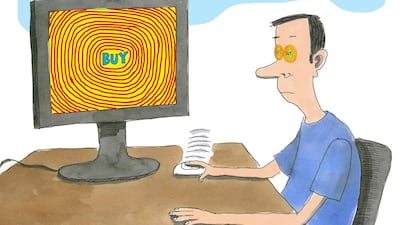This is war. Mind games are being played. We are being played.
It's a constant fight over our money – and who gets to keep it.
The battle heats up at this time of the year – with us thinking that shopping during the sales is clever. Not so fast, oh wise one – you'll have to be extra-special to overcome the wily ways of marketing mind-benders – whose mission is to part you with your cash.
Yes, you are being manipulated. The irony for me is that marketing people should be lauded as leaders in behavioural finance. To our detriment.
I used to fall for their conniving ways every time I'd buy a coffee. I'd justify the decreasing price difference the bigger the size on offer and just go for their largest one. Who wouldn't? It was definitely a better deal. Ah, but better for whom? Enter the decoy effect.
An MIT study – based on an Economist subscription advert – shows us how it works:
Offer A: internet only subscription for US$59
Offer B: Print only subscription for $125
Offer C: Print and internet subscription for $125
These days we only need offer A – which appears reasonable. But when we read down the list, we convince ourselves that offer C is a "better" choice. It's the old Good-Better-Best pricing model that influences us to opt for C.
And this is what most participants did. A few went for A. No one chose B.
What happens when B – the decoy – is removed? This time the study found that 68 per cent of those participating chose the more sane option A.
This means that the decoy effect helps businesses make more money from us.
Note the decoy effect does not mean a third option bang in the middle – you'll find that it mimics the lower end for value, and the upper end in terms of cost. So we think it is clever to go for the top priced product – when we do not need to.
There are other types of effects that can work in threes. Like the compromise effect.
You'll know you're being herded to buy the middle choice when it is bang in the middle cost-wise and perceived value-wise too.
Studies find that a great way to shift a certain product is to have it displayed in between a luxury version – out of reach for most people – and a cheaper version. Suddenly the one in the middle is deemed perfect. Decision made. Card swiped.
The list of how we're hoodwinked is long. It includes the left digit effect – when people perceive a price ending with a nine as a better deal.
Using odd numbers is another strategy – this works with things like Uber too, with people happy to pay more if the cost is an odd, non-rounded up number, like 43.50 or 76. Because it looks like there's a real, solid reason for the price tag, rather than a seemingly made up, rounded up number like 20, 40 or 70.
Bundling items gets them selling – we like to buy things in multiples. Add to this products that complement what we set out to purchase.
This is where you get to admit that yes, you have fallen for the neuromanipulation to spend on things you don't need – or perhaps even want – to qualify for the not so "free delivery" minimum outlay.
Think of all this as a voyage that ends with either death or becoming destitute.
It starts with open the wallet tactics – like bargains at the entrance, going on to the decoy and compromise influenced decisions, depending on what they're trying to shift – and for an element of excitement, if you're lucky, a treasure hunt – where you get to find that wonderful bargain that others somehow missed.
Who's feeling smug now?
Guess what. Just as there'll always be "just one more thing" – there will always be another sale, another bargain, another time. So put your wallet away. Now.
A lot of thinking goes into how to get us to spend. There's an army of marketing pros who are buffing up on our psychology for this very purpose.
Scary stuff. If you don't believe me, go ahead and search for "how to get people to spend more" and read up.
It would be so very powerful if we were to be wise, see right through it and watch from afar. Instead the war wages on, and I hate to tell you – but we're on the losing side.
Nima Abu Wardeh describes herself using three words: Person. Parent. Pupil. Each day she works out which one gets priority, sharing her journey on finding-nima.com.
pf@thenational.ae
Follow us on Twitter @TheNationalPF

Think you’re getting a deal? Caveat emptor
Retail marketeers are experts in behavioural finance and the psychology of getting us to spend more. The only way to win the war is to put your wallet away.
Most popular today
